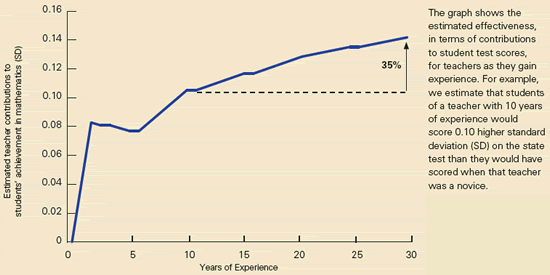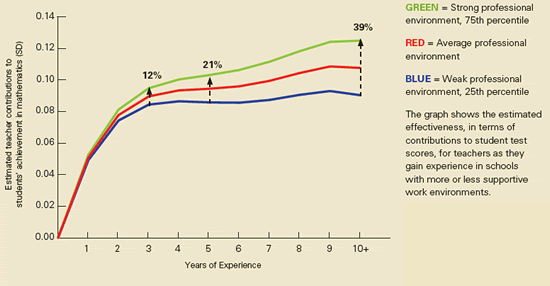Efforts to improve the quality of the teacher workforce have risen to the top of the education policy agenda during the past decade. More than ever, policymakers are drawing on research to inform their positions. One research finding that policymakers cite consistently in conversations about teaching quality is that teachers face a "performance plateau" after their first few years of teaching.
On average, the argument goes, teachers don't improve their effectiveness after their first several years in the classroom. For much of the past decade, this "performance plateau" has been characterized as a fact in the research literature (Rice, 2013), and this idea has profoundly affected education policy. For example, a 2012 fact sheet by TNTP (formerly known as The New Teacher Project) reported that "teachers gradually reach a plateau after 3–5 years on the job," and Bill Gates asserted in 2009 that "once somebody has taught for three years, their teaching quality does not change thereafter."
But new research, including our own, not only calls this conclusion into question, but also suggests that teachers can continue to improve substantially after the first five years. Using 10 years of data from a large urban U.S. school district and looking at how teachers' contributions to student standardized test scores changed as they gained experience, we found evidence that teachers do continue to improve over the course of their careers (Papay & Kraft, 2015).
In Figure 1, we present the estimated returns (in student achievement) to years of experience for mathematics teachers in our sample. As is common with nearly all professions, teachers improved most rapidly in their first few years on the job. However, our estimates showed teachers continuing to improve, at least in their ability to raise student test scores, well beyond these initial years. In fact, estimates suggest that 35 percent of a teacher's career improvement happens after year 10.
Figure 1. Estimated Returns in Student Achievement to Years of Teaching Experience (in Mathematics)
Source: This image was published in the Journal of Public Economics, 130, J. P. Papay and M. A. Kraft, "Productivity Returns to Experience in the Teacher Labor Market," pp.105–119. Copyright © 2015 Elsevier. Adapted with permission.
These results have resonated with many teachers and school leaders, who report anecdotally that teachers continue to refine their practice and invest in improvement well into their careers. At a minimum, our evidence shows that the question of how much teachers improve after the first few years of teaching isn't settled.
We also found, however, that teachers vary a great deal in how much they improve over time. Some teachers do plateau, whereas others continue to improve. And teachers in some schools improve at greater rates than others. Thus, schools appear to play an important role in promoting or constraining a teacher's professional growth. These findings challenge the common characterization of "teacher quality" as a fixed characteristic of an individual teacher. We believe policymakers need to change this fixed characterization so we can focus our efforts on learning how teachers improve over time and what role the school plays in supporting improvement.
It's Complicated
The question of how teachers improve over the course of their careers is difficult to study quantitatively. Our results are different from those commonly cited in the policy arena for two main reasons. First, our estimates compared teachers who were 10-year veterans in 2015 to themselves as novices in 2005—not to different novice teachers in 2015. We call this focus on how individual teachers improve over time the "within-teacher returns to experience." Comparing cohorts of teachers to one another, as some studies have done, answers a different question.
Second, to compare how teacher effectiveness changes as teachers gain experience, researchers must rely on one of several different assumptions. Not surprisingly, which assumption they choose matters. We analyzed our data set in different ways, using several different assumptions, and found the same general pattern: teachers improved throughout their careers in the district we studied. Our results mirror those of several other recent studies (for example, Harris & Sass, 2011; Ladd & Sorenson, in press) and reflect a growing body of research that provides examples of ways schools are promoting veteran teachers' effectiveness.
Our findings don't cover all aspects of teachers' effectiveness, of course. They focus on one narrow slice of teachers' work in schools—their ability to raise student test scores in mathematics and reading. Studies show that teachers also affect a range of nontested student outcomes, such as attendance, self-efficacy, and perseverance (Blazar & Kraft, 2015; Gershenson, 2016), and that those teachers who demonstrate a strong ability to raise student achievement on tests aren't necessarily the ones who best develop students' academic behaviors and mindsets. Veteran teachers' impact also extends beyond their students. Experienced teachers can mentor colleagues, maintain institutional knowledge, serve in teacher leadership roles, and support a strong professional environment.
Although how teachers improve on average is an interesting academic question, the more practical question is, What conditions support continued teacher development? In a recent study, we found that teachers working in schools with strong professional environments improved much more than teachers in schools with weak professional environments (Kraft & Papay, 2014). We used six measures drawn from teacher surveys to characterize the professional environment: consistent order and discipline, opportunities for peer collaboration, supportive principal leadership, effective professional development, a school culture characterized by trust, and a fair teacher evaluation process providing meaningful feedback.
As Figure 2 shows, teachers in schools with relatively supportive work environments (the top line) improved at much greater rates than did their peers in schools with relatively unsupportive environments (the bottom line). These differences are substantial. They suggest that a given teacher will be 39 percent more effective by year 10 if he or she works in a supportive school than if he or she works in a less supportive one. Strong work environments create better learning opportunities for everyone.
Figure 2. Predicted Returns in Student Achievement to Years of Teaching Across Schools with Strong, Average, and Weak Professional Environments (in Mathematics)
Source: From "Can Professional Environments in Schools Promote Teacher Development? Explaining Heterogeneity in Returns to Teaching Experience," by M. A. Kraft and J. P. Papay, 2014, in Educational Evaluation and Policy Analysis (December).
Promising Levers
If teachers improve more in broadly supportive work environments, we need to consider what specific policies and practices schools should adopt to support and promote teacher development. Although attempting to identify any silver bullet is a fool's errand, rigorous studies have identified several promising approaches.
Peer Collaboration
Evidence suggests that veteran teachers can become better teachers if they work in schools with effective systems of peer collaboration. A study by researchers from the University of Michigan and Vanderbilt University showed that teachers in Miami-Dade County Public Schools in Florida improved at substantially faster rates in schools where strong collaboration took place through instructional teams (Ronfeldt et al., 2015). This study builds on a body of literature showing that teachers who work with more effective colleagues improve more (Jackson & Bruegmann, 2009).
Teacher Evaluation
In the past decade, many states and school districts have reformed their teacher evaluation systems to hold teachers more accountable for their performance and to provide more detailed feedback. These systems hold tremendous promise for supporting teacher development as long as they provide teachers with detailed feedback about how to improve their classroom practices. For example, Taylor and Tyler (2012) showed that experienced teachers who participated in a rigorous teacher evaluation system in Cincinnati, Ohio, improved their classroom effectiveness, not only in the year they were evaluated, but also in future years. Steinberg and Sartain's (2015) analysis of one pilot evaluation system documented significant improvements in teachers' ability to improve reading achievement—when principals received substantial training and support as they carried out cycles of teacher observation followed by feedback.
Another model is Peer Assistance and Review (PAR) programs, which exist in a few dozen school systems across the country and have proven effective at improving the instructional skills of low-performing veteran teachers (Papay & Johnson, 2012). In this model, expert consulting teachers provide intensive support and conduct high-stakes evaluations for low-performing experienced teachers and novices.
Tailored On-the-Job Training
In recent years, "teacher professional development" has been disparaged. Many reports have noted the mismatch between the huge sums of money spent on such programs and the limited evidence of effectiveness of these investments (TNTP, 2015; Yoon et al., 2007). However, although broad-based professional development efforts may be ineffective, recent research paints a more optimistic picture of targeted efforts to provide on-the-job training.
Several studies have shown that interventions that involve individualized coaching and that offer context-specific, narrowly tailored professional development improve teacher effectiveness (for example, Allen et al., 2011; Blazar & Kraft, 2015; Papay et al., 2016; Powell et al., 2010). Coaching programs differ substantially in their design and focus, but those programs with demonstrated evidence of success often share these elements: They are individualized; intensive, involving frequent coaching sessions; sustained over a full year or more; tailored to classroom contexts; and focused on a manageable set of specific skills.
Organizational Supports
A recent study by Susan Moore Johnson's Project on the Next Generation of Teachers at Harvard University (in which we participated) suggests that specific organizational supports played a key role in facilitating teachers' abilities to succeed with their students (Kraft et al., 2015). The study involved in-depth case studies of teachers' experiences in six high-poverty, majority-minority, urban public schools. (See Susan Moore Johnson's article in this issue on p. 24.)
Across the schools, teachers described how valuable it was when their school established an orderly, disciplined learning environment, offered services that helped meet students' social and emotional needs, and engaged parents. Teachers spoke convincingly about how these organizational initiatives enabled them to not only succeed with their current students, but also continue to improve their practice over time. For example, teachers and administrators at several schools emphasized breaking down communication barriers by hosting parents at activities at school and in the community. Teachers reported that these efforts paid off when students had difficulties and they could call parents whom they knew to seek out support and advice.
Often, the clearest evidence of the importance of the school environment came from contrasts across schools. For example, teachers we interviewed at two high schools serving similar student populations related starkly different experiences with student discipline. In one school, teachers were expected to deal with student behavioral challenges individually, in their classroom or in the hallways. The lack of consistent policies, consequences, and follow-through by school administrators left teachers frustrated. Many said that the school's lack of order and discipline made them less effective instructors. By contrast, teachers in the other high school found that the administration's efforts to create clear policies and enforce them consistently had helped create an environment conducive to learning.
School principals play a key role in fostering productive professional environments in schools. They are the ones who establish strong organizational supports and build growth-enhancing schoolwide cultures. Hiring principals who have the talent to identify organizational weaknesses, establish schoolwide systems to support teachers and students, and galvanize collective buy-in from teachers is a central lever for improving the teaching and learning environment.
Of course, in all these examples, the devil is in the details. Collaboration through teams is only effective if these teams are structured well and aligned with teachers' needs and interests. Evaluation systems that place too much emphasis on accountability without opportunities for teachers to receive and act on valid, detailed feedback are unlikely to lead to lasting improvements. Professional development investments are easily squandered when they neglect teacher agency, and schoolwide supports must be tailored to each specific school context. Nonetheless, we see each of these approaches as a promising way forward.
Improving Our Improvement Efforts
Any serious policy conversation about improving instructional quality in the United States must grapple with the question of how to promote teacher improvement. If policy reforms ignore the value of developing teachers and of leveraging the accumulated knowledge of experienced teachers, these reforms will likely fall short of their goals. Teachers who have the supports necessary to improve are likely to invest in their own professional growth, feel a sense of success, and remain in the classroom (Johnson & Birkland, 2003). This is important because high rates of teacher turnover are detrimental to instructional coherence and student learning (Ronfeldt, Loeb, & Wyckoff, 2013).
The sheer size of the teacher labor market, with more than 3.5 million K–12 educators, necessitates policy solutions that center on helping current teachers get better. At this scale, even small improvements in educator effectiveness would result in meaningful changes for students and, eventually, the economy.
When people view the discouraging evidence that often surfaces as research examines whether professional development efforts lead to longstanding teacher improvement, they usually choose one of two common responses—to abandon efforts to develop teachers or to improve those efforts. Our research supports choosing the second option, because it indicates that entire districts are capable of promoting sustained improvement for teachers beyond the supposed five-year plateau. Although there's no one blueprint for improving on-the-job training and providing supports for teacher growth (and some efforts will inevitably fail), such efforts have real potential. We hope policymakers and educators continue to invest in these supports so that the teaching profession will be a learning profession throughout teachers' entire careers.




